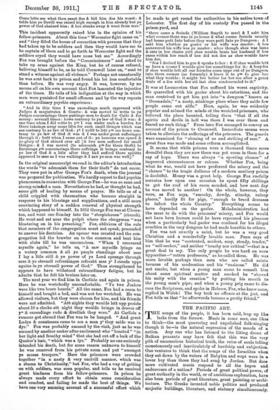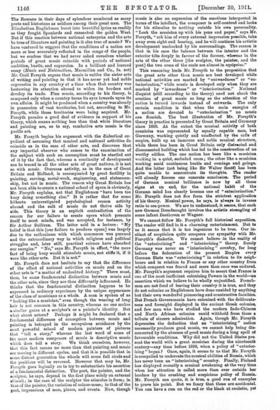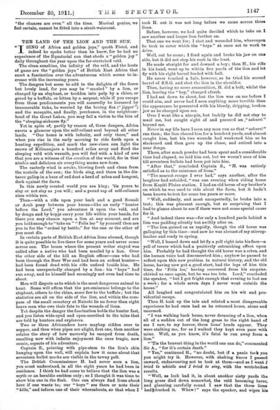THE PACIFIC ART.
THE songs of the people, it has been said, leap up like larks from the furrow. Music in some sort, one likes to think—the most quavering and unpolished folk-singing though it be—is the natural expression of the moods of a nation. Any one who has listened to the lilting drone of Balkan peasants may have felt that this was the very pith of unconscious historical truth, the voice of souls telling monotonously and inarticulately of hardship and subjection. One ventures to think that the songs of the Israelites when they sat down by the waters of Babylon and wept were in a lower key than those they had sunk by Jordan. But does more cultivated music respond to all the hopes and endeavours of a nation P Periods of great political power, of great authority in the world, or of ambitious exploration, have also been periods of great literature, great painting or archi- tecture. The Greeks invented noble polities and produced majestic buildings, literature, and statuary simultaneously.
The Romans in their days of splendour numbered as many poets and historians as soldiers among their great men. The Elizabethan Englishmen burst into beautiful lyrics as readily as they fought Spaniards and ransacked the golden West. But if this reaction between national enterprise and the arts be true of literature and painting is it also true of music P We have ventured to suggest that the conditions of a nation are more or less accurately reflected in the songs of the people, but we confess that we had never asked ourselves whether periods of great music coincide with periods of national ambition, bustle, and expansion. In a brilliant and learned
essay (Music and Nationalism, Macmillan and Co., 5s. net)
Mr. Cecil Forsyth argues that music is unlike the sister arts of writing and painting in that it has never yet had noble expression in any country at a time when that country was bestowing its attention abroad to widen its borders and develop its trade. Fine music, according to his theory, is composed only when a country turns its eyes inwards upon its own affairs. It might be produced when a country was already in possession of vast territories, but not, according to Mr.
Forsyth, while those territories were being acquired. Mr. Forsyth parades a good deal of evidence in support of his theory, which means nothing less than that while literature and painting are, so to say, combative arts music is the pacific art.
Mr. Forsyth begins his argument with the dialectical ex- pedient of assuming that musical and national activities do coincide as in the case of other arts, and discovers that any impartial observer who comes to the examination of the subject with such an assumption must be startled out of it by the fact that, whereas a continuity of development can be traced in all the other arts of great nations, it is not so with music. Overseas activity, as in the case of Great Britain and Holland, is accompanied by great fertility in
painting, carving, metal-work, engineering, and statesman- ship, but not in music. The reason why Great Britain has not been able to create a national school of opera is obviously, Mr. Forsyth explains, not that Englishmen "have been too busy doing something else." It is rather that for some hitherto uninvestigated psychological reason activity abroad and the cult of music do not thrive side by side. This theory is an explicit contradiction of the reason for our failure to create opera which presents itself to most minds, and was accepted, for instance, by Sir Arthur Sullivan. The latter said in a lecture : " My belief is that this [our failure to produce opera] was largely duo to the enthusiasm with which commerce was pursued and the extraordinary way in which religious and political struggles and, later still, practical science have absorbed our energies." " No," says Mr. Forsyth in effect, " the mere fact of being busy would stimulate music, not stifle it, if it were like other arts. But it is not."
Mr. Forsyth does not hesitate to say that the difference of the effect of national activities on music and on the other arts is "a matter of undoubted history." There must, then, he some fundamental distinction between music and the other arts, since they are thus differently influenced. He thinks that the fundamental distinction happens to be expressed in ordinary experience by the unique appearance of the class of musicians as a whole. A man is spoken of as " looking like a musician," even though the wearing of long hair is not common in this country, whereas no one makes a similar guess at a sculptor's or a painter's identity. But what about actors P Perhaps it might be declared that a fundamental difference of conception between music and painting is betrayed in the scrupulous avoidance by the most powerful school of modern painters of pictures that " tell a story," whereas the last word of some of the most modern composers of music is descriptive music which does tell a story. We think ourselves, however, that this fact means no more than that painting and music are moving in different cycles, and that it is possible that in some distant generation the wheels will come full circle and the positions will be reversed. However that may be, Mr. Forsyth goes logically on to try to substantiate his assertion of a fundamental distinction. The poet, the painter, and the sculptor, he says, depend in the first place solely on external stimuli ; in the case of the sculptor the stimulus is form; in that of the painter, the variation of colour-mass; in that of the poet, impressions of men, places, and events. Now, though music is also an expression of the emotions interpreted in terms of the intellect, the composer is self-centred and looks for his stimulus to nothing outside his own personality. " Lock the musician up with his pens and paper," says Mr. Forsyth, "rob him of every external impression possible, take away even sight and hearing, and he will continue his artistic development unchecked by his surroundings. The reason is that in his case the balance between the interior and the exterior tilts deeply in favour of the former, whereas in the arts of the other three [the sculptor, the painter, and the poet] the two arms of the scale are almost in equipoise."
This reasoning leads Mr. Forsyth to the proposition that the great arts other than music are best developed while national activities are marked by " outwardness" or " ex- teriorization," while music is developed only when they are marked by " inwardness" or " interiorization." National disquiet (still according to the theory) need not check the creation of great music so long as the attention of the nation is turned inwards instead of outwards. The only certain condition is that when the main energies of a nation are devoted to " exteriorization " no music can flourish. The best illustration of Mr. Forsyth's theory in practice is presented by Great Britain and Germany since 1600. At the outset the musical activity of both countries was represented by equally capable men, but Germany, working quietly and unaffected by the calls of empire, built up an immense and noble musical structure, while there has been in Great Britain only distracted and disconnected building which has led to the construction of no worthy edifice. The one nation has been like a musician working in a. quiet, secluded room ; the other like a musician working amid continuous bustle and comings and goings. And the latter (uot being like Sir Walter Scott) has been quite unable to concentrate its thoughts. The reader will already foresee one concrete conclusion. The period of German musical brilliance is now by all these signs at an end, for the national habit of the German mind has clearly become one of "exteriorization." Mr. Forsyth does not flee from the strictest application of his theory. Musical power, he says, is always in inverse ratio to sea-power. We are to understand, it seems, that each new German Dreadnought involves the artistic strangling of some infant Beethoven or Wagner.
We cannot follow Mr. Forsyth's full historical exposition. The reader will find in it a charming entertainment. But to us it seems that it is too ingenious to be true. Our in- stinct of scepticism quite conquers our sympathy with Mr. Forsyth's dialectic. We cannot believe in the reality of the " exteriorizing " and " interiorizing " theory. Surely Germany was never an " interiorizing " country, for long before the federation of the present Empire every German State was " exteriorizing " in relation to its neigh- bours and in relation to France or any other country from which conquest was feared and more than once was endured. Mr. Forsyth's argument requires him to assert that France is one of the most inefficient colonizing Powers in the world—an assertion which we believe to be wholly unjustified. French- men are not fond of leaving their country it is true, and they do not colonize as Englishmen have done unaided by anything but their own wonderful pioneering and constructive faculties. But French Governments have colonized with the deliberate- ness and foresight displayed in the ancient Greek colonies, and few men who have studied the modern Indo-Chinese and North African colonies could withhold from them a tribute of sincere admiration. Again, though Mr. Forsyth deprecates the deduction that an "interiorizing" nation necessarily produces good music, we cannot help being dis- concerted by the absence of good music during a long spell of favourable conditions. Why did not the -United States pre. sent the world with a great musician during the nineteenth century—any time before 1898, when a policy of "exterior- izing " began ? Once, again, it seems to us that Mr. Forsyth is compelled to underrate the musical abilities of Russia, which has never been an " interiorizing " country. Finally, Finland has displayed recently a musical awakening at the very time when her attention is called more than ever outside her borders by the crushing and suspicious policy of Russia. Mr. Forsyth can quote, it is true, a good run of examples to prove his point. But we fancy that these are accidental. You can have a run on the red or the black at roulette, yet 'the chances are even" all the time. Musical genius, we feel certain, cannot be fitted into a strait-waistcoat.








































 Previous page
Previous page